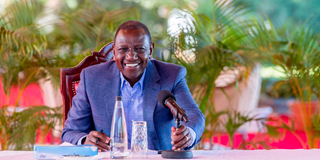Premium
Ruto: No state regulation of Kenyan churches

President William Ruto
President William Ruto has said that the government will not regulate religious activities in Kenya and has asked religious leaders to develop their own regulations.
The President, who appears to be moving on swiftly from the horrors of the Shakahola massacre, has assured the church and other religious groups that his government has no plans to regulate religious activities in Kenya.
In the wake of the massacre that shook the nation, Dr Ruto formed a task force to investigate the factors that led to the deaths of more than 400 people and the disappearance of hundreds of others.
The 18-member task force, headed by Reverend Mutava Musyimi, was tasked with identifying gaps that allowed extremist religious organisations to operate in Kenya.
It was mandated to formulate a legal framework to prevent radical religious organisations from operating locally and to come up with proposals for civic education to sensitise Kenyans on the need to avoid religious cults.
The team was also expected to recommend measures that the state could take against individuals and organisations suspected of engaging in extremist religious practices.
Among the key recommendations of the task force were the enactment of statutes for religious organisations, the establishment of a Religious Affairs Commission (RAC), and the adoption of a hybrid regulatory model of self-regulation and state oversight.
“The recommendations are geared towards the safeguarding of the exercise of the fundamental freedoms of religion and association while balancing the enjoyment of these freedoms with the preservation of public interest, safety, welfare and good as protected by the Constitution,” said the task force when it presented its report to Dr Ruto in July 2024.
The RAC, which is to be established by an Act of Parliament, will act as an oversight body for all religious organisations.
“The primary role of the commission is to provide a convergence point between the state and religious organisations for the sole purpose of oversighting religious organisations,” said the report.
Tana River Senator Danson Mungatana drafted and tabled the Religious Organisations Bill (2024), which immediately caused a storm among religious groups, with some church leaders rejecting it.
Others went into overdrive, lobbying the Head of State and other key political leaders not to support the Bill, which, if enacted, would, among other things, avert a repeat of the mass deaths blamed on religious extremism.
The Bill provides for the establishment of a registry of religious organisations, such as churches, which would have the power to grant or revoke the registration of religious organisations and religious leaders at any time.
The Bill also states that a person shall not establish, manage, operate or assist in the establishment, management or operation of a religious organisation or a religious umbrella organisation unless the organisation is registered.
The Bill proposes a Sh5 million fine or a three-year jail term for churches and clergy who fail to register in accordance with the law if it sails through Parliament.
But addressing the congregation at AIC Milimani on Sunday, the President said the government would rather seek to adhere to the Constitution of Kenya, which recognises freedom of worship.
“The preamble of the Constitution of Kenya says God of all creations, as the beginning of the Constitution of Kenya, meaning that we surrender to God, and that is why Kenya shall continue to be the God-fearing nation, and we will defend the freedom of worship in our republic,” the President said.
He said that his administration would ensure that there is no limitation on religious activities, which would seek to compromise the Constitution.
“I know that there are proposals that have been made in some quarters about regulation of the church, regulation of worship and regulation of religious activities. I want to remind those who are pursuing that kind of exercise that the Constitution of Kenya is very explicit on the freedom of worship, and there will be no compromise whatsoever, there will be no limitation whatsoever in freedom of worship in Kenya.”
Dr Ruto asked religious leaders to develop plans on how they would like to regulate religious activities without the government’s interference.
“A religious body in Kenya will decide how they want to make sure that the freedom of worship in Kenya is protected.”
President Ruto asked the church to pray for the country and called for unity amidst the ongoing political situation.
“Continue to pray for the unity of Kenya, for the prosperity of Kenya and that all of us as Kenyans will know the will of God.”
He steered clear of the ongoing plans to impeach his deputy Rigathi Gachagua, an initiative that is set to enter a crucial stage this week after a public participation drive.
On Sunday, Mr Gachagua hosted a prayer service at his Karen residence home, mainly attended by his supporters.





